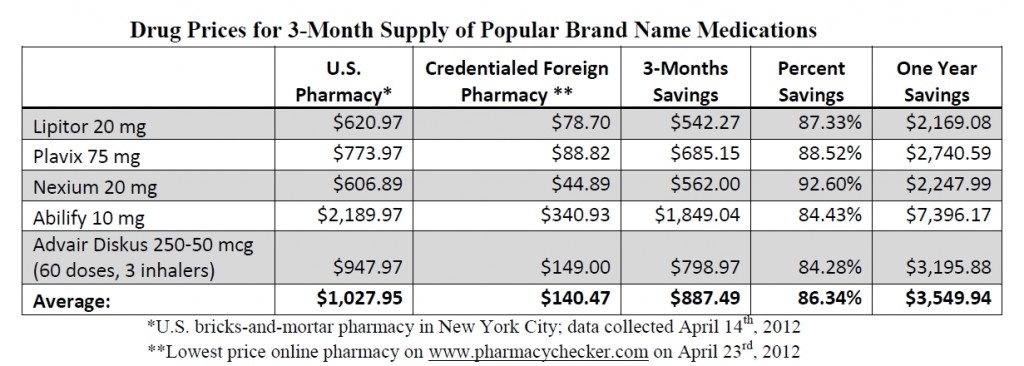PharmacyChecker Informs Surgeon General and HHS On Safe Use of Online Pharmacies To Improve Medication Adherence
The problem of Americans not taking medications is caused by high costs of prescription drugs, undesirable side-effects, health literacy, forgetfulness among other reasons. Medication non-adherence is a $317 billion problem. The U.S. Surgeon General and the Department of Health and Human Services issued a request to individuals and organizations to submit information about the national problem of medication adherence. Specifically, the government’s request presents “the opportunity to identify issues relevant to all levels of government, as well as individuals, health care providers, and industry and private organizations in efforts to improve medication adherence in adults with chronic conditions.”
Since cost is one of the critical factors inhibiting Americans from getting needed medication, we believe the government should take more proactive steps to provide useful information about how to obtain affordable medication online. Our analysis and recommendations are published below. For a PDF copy click here.
The Honorable Howard K. Koh, MD., M.P.H.
Assistant Secretary for Health
The Honorable Vice Admiral Regina M. Benjamin, M.D., M.B.A.
Surgeon General of the United States
Room 710-H
200 Independence Ave., SW
Washington DC 20201
Re: Request for Information on Prescription Medication Adherence
Submitter: Gabriel Levitt, Vice President, PharmacyChecker.com, 333 Mamaroneck Avenue, White Plains, NY 10605. (718) 387-4526, Gabriel.levitt@pharmacychecker.com.
Prescription medication non-adherence should be treated as a national crisis since so many Americans suffer as a result. Some of the reasons for non-adherence are health literacy, psychological issues, side effects of medications, and lack of support systems. There are also tens of millions of Americans who simply can’t afford medication. A survey by the Commonwealth Fund found that 48 million Americans did not fill a prescription in 2010 due to high medication costs.[i] The data show the negative health and economic effects of non-adherence to prescription medication. First, it’s been reported that 121,000 people die each year due to prescription non-adherence.[ii] Second, according to the FDA, non-adherence to prescription medication costs the country $290 billion annually in additional health care costs.[iii] Third, numerous studies have shown that cost is either the number one reason, or a major factor for non-adherence. [iv]
Access to safe and affordable medication should be encouraged through all available sources, including personal drug importation. Over the past 15 years millions of Americans have obtained needed prescription drugs through non-U.S. online pharmacies, despite its technical illegality. Currently, the U.S. Food and Drug Administration does not prosecute people for small quantities of personal drug imports.
The FDA discourages Americans from ordering from any non-U.S. online pharmacy, not because it’s illegal but for safety reasons. Its position is that the drugs ordered from Canadian and other foreign pharmacies are not regulated by the FDA, and are therefore unsafe. That position is simply unsubstantiated. Fortunately for people living in other countries there are other national regulatory authorities that regulate drugs to make sure they are safe and effective.
We’ve established that the problem of prescription medication adherence is so severe in large part due to high drug prices. If it is safe to order less expensive medication online that allows Americans to adhere to their doctor’s prescription then we should encourage their use. Are non-US online pharmacies safe?
The evidence shows that properly credentialed non-US online pharmacies which fill orders from licensed pharmacies, require a valid prescription, and provide verifiable contact information on their websites safely dispense genuine medication. The medication purchased for personal drug importation is often the same brand name product – from the same manufacturer – sold here but at a much lower price, often 80% less than U.S. pharmacies. A consumer is almost certain to receive proper care and safe medications from one that meets the aforementioned criteria and is certified in the PharmacyChecker.com Verification Program.[v] In fact, U.S. Government Accountability Office studies have shown the relative safety of Canadian online pharmacies compared to U.S. online pharmacies.[vi]
We recommend that the Secretary of Health and Human Services instruct the U.S. Food and Drug Administration to:
- Correct its website and consumer communications about online pharmacies to reflect the facts demonstrated by over a decade of studies and consumer experience. The FDA website should communicate that “if you decide to purchase medication online from Canada or another country then only use properly credentialed websites.”
- Explicitly allow, at least on a temporary basis, personal drug importation through properly credentialed non-US online pharmacies.
By taking these steps fewer Americans will go without needed prescription medication because it will be affordable. Moreover, more people taking prescribed medication will lead to fewer hospitalizations and emergency room visits, resulting in lower healthcare costs for the nation.
Sincerely,
Gabriel Levitt
Vice President
PharmacyChecker.com, LLC
[ii] Cut Copayments to Bolster Adherence”, The Center for Medicine in the Public Interest, See http://www.cmpi.org/in-the-news/in-the-news/cut-drug-copayments-to-bolster-adherence/(last accessed July 27, 2011).
[iii] Campaign to Improve Poor Medication Adherence (U18), A Notice by the Food and Drug Administration on 03/09/2011, See http://www.federalregister.gov/articles/2011/03/09/2011-5287/campaign-to-improve-poor-medication-adherence-u18#p-13, (last accessed July 27, 2011).
[iv] For more information see: http://www.federalregister.gov/articles/2011/03/09/2011-5287/campaign-to-improve-poor-medication-adherence-u18; http://www.nclnet.org/images/PDF/adherence_focus_groups.pdf; http://www.hsph.harvard.edu/news/press-releases/2008-releases/poll-usa-today-kaiser-harvard-prescription-drugs.html (last accessed July 27, 2011)
[v] Bate, Roger, Ginger Zhe Jin and Aparna Mathur. “Unveiling the Mystery of Online Pharmacies: An Audit Studay”. National Bureau of Economic Research. Working Paper #17655 (http://www.nber.org/papers/w17955.pdf). April 2012.
[vi] U.S. Government Accountability Office. Some Internet Pharmacies Pose Safety Risks For Consumers, GAO-04-820. Washington, DC. Government Accountability Office June 2004. See http://www.gao.gov/new.items/d04820.pdf (last accessed June 26th, 2011).



